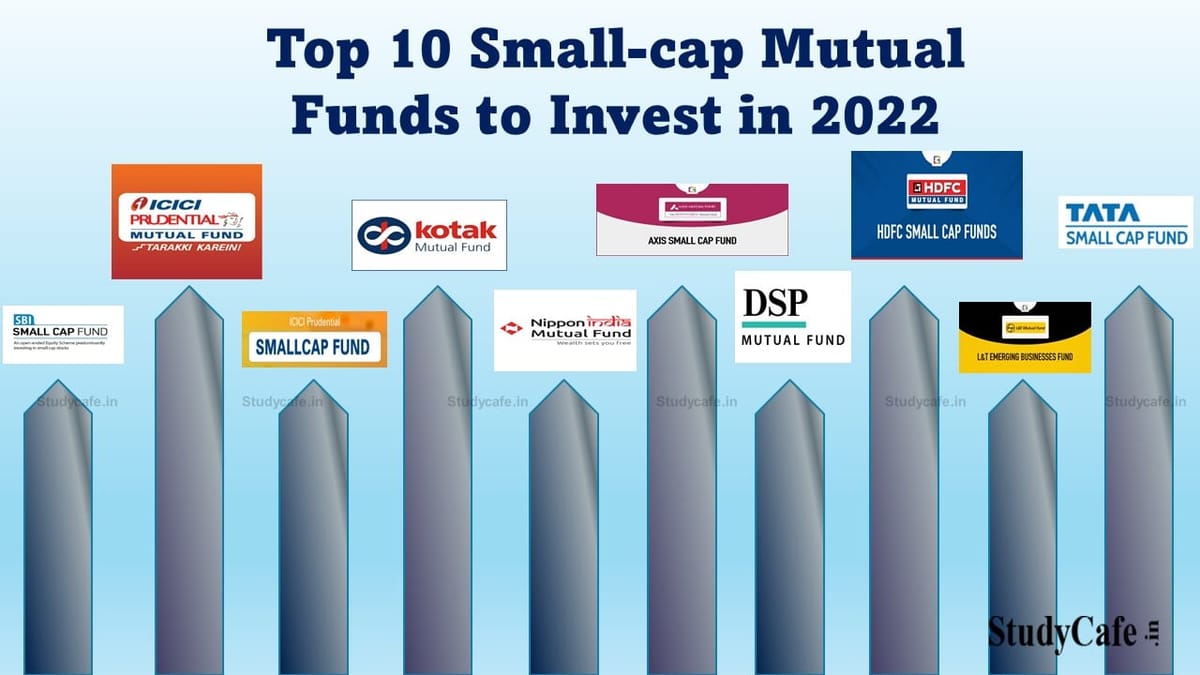Top 10 Small-cap Mutual Funds to Invest in 2022
Deepshikha | Jan 17, 2022 |

Mutual funds are classified according to their investing strategy. The majority of equity mutual funds’ assets are invested in stock and equity-related products. The Securities and Exchange Board of India (SEBI), India’s regulatory body, has standardized mutual funds based on their categories and characteristics.
Small-cap mutual funds are mutual funds that invest in stocks. The asset allocation of small-cap funds is such that at least 65 percent of their total assets are invested in small-cap companies. Small-cap firms are those that have a market value of less than $250 million. To put it another way, these are firms with a market valuation of less than INR 500 crores.
Small-cap mutual funds are open-ended equity funds that focus on small-cap stocks. The asset allocation of these funds’ portfolios requires a minimum of 65 percent of total assets to be invested in small-cap equities and equity-related products. Small-cap corporations are rapidly growing businesses with aggressive expansion plans. These securities are more volatile and susceptible to market fluctuations. As a result, small-cap mutual funds are riskier than large-cap, mid-cap, or multi-cap funds.
Small-cap mutual funds are a high-risk investing alternative for investors who are willing to take a chance. Significant rewards are meant to compensate for the risk taken. Small-cap mutual funds can outperform their benchmarks over time. Returns from top funds can be as high as 12-15 percent over a 7-10 year investment horizon.
The most important thing to remember while investing in small-cap mutual funds is to remain patient. Investing in small-cap funds regularly helps to smooth out risk and market swings. As a result, investing through a systematic investment plan (SIP) will pay off in the long run. Furthermore, investors should avoid panic selling; investing throughout the course of a business cycle is always profitable. Hence Small-cap funds have a decent chance of earning a big return over time. Past performance, on the other hand, is only an indicator of the fund’s success since its start. Past performance should not be relied upon heavily by investors.
Fund Name |
| SBI Small Cap Fund (G) |
| ICICI Prudential Small-cap Fund Institutional (G) |
| ICICI Prudential Small-cap Fund (G) |
| Kotak Small Cap fund (G) |
| Nippon India Small Cap Fund (G) |
| Axis Small Cap Fund (G) |
| DSP Small Cap Fund (G) |
| HDFC Small Cap Fund (G) |
| L&T Emerging Businesses Fund (G) |
| Tata Small Cap Fund (G) |
Hence Small-cap funds have a good potential of making a significant profit over time. On the other hand, past performance is merely a measure of the fund’s success since its inception. Investors should not place too much emphasis on past success.
Small-cap mutual funds with the best performance have the potential to outperform the market. Because small-cap mutual funds invest primarily in small-cap equities, they tend to have comparable strengths and downsides. During a bull market, small-cap stocks are frequently featured in the list of high-yielding equities. These stocks frequently feature on lists of multi-baggers. In a bad market, however, returns may be severely impacted and may even be negative.
Small-cap mutual funds carry a higher level of risk than large-cap and mid-cap funds. This is because, unlike small caps, large and midcap corporations are better equipped to deal with adversity. Because large-cap companies are more established, negative market emotions have a smaller impact on them than smaller enterprises. Small-cap companies, on the other hand, are newer businesses that are transitioning to mid and large-cap status. Even a minor market decline might have a negative impact on these businesses.
Long-term is synonymous with the best small-cap mutual funds. Any investments made in these funds must be held for at least seven years. It does not have any hard and fast rules. Long-term investing, on the other hand, will help to spread the risks connected with them while also creating large rewards.
Small-cap mutual funds are very volatile due to their sensitivity to market conditions. Small-cap stocks react quickly to market changes. Investor mood, economic circumstances, company actions, and other factors all have an impact on these equities. This volatility can either result in huge market-beating returns or have a detrimental impact on small-cap mutual fund performance.
Small-cap mutual funds invest in firms with a market capitalization of less than $1 billion. Companies with lesser revenues, as well as new business firms in their early stages of development, fall into this category. Because the businesses are young, they have a far higher growth potential than large and mid-cap funds.
In case of any Doubt regarding Membership you can mail us at [email protected]
Join Studycafe's WhatsApp Group or Telegram Channel for Latest Updates on Government Job, Sarkari Naukri, Private Jobs, Income Tax, GST, Companies Act, Judgements and CA, CS, ICWA, and MUCH MORE!"